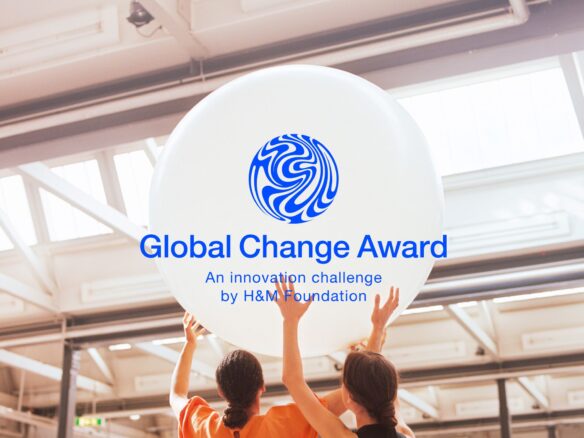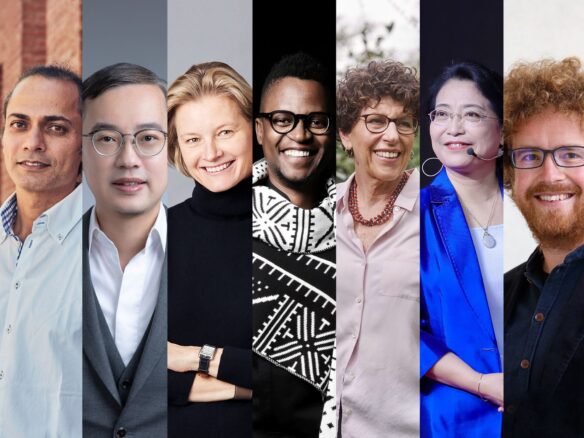The winners will be announced on 8 June 2023. Stay tuned!
MATERIAL
Algreen (UK)
Algreen invents the world’s first entirely biobased polyurethane that is both recyclable and biodegradable for sustainable fashion. Polyurethanes are widely used in the fashion industry for making foam, adhesive and waterproof coatings.
ALT TEX (Canada)
ALT TEX has created the world’s first carbon neutral and biodegradable polyester alternative, engineered from the world’s largest landfill contributor – food waste. The bio polyester eliminates the fashion industry’s dependence on carbon-intensive fabrics.
Arda Biomaterials (UK)
Arda Biomaterials transforms a widely available feedstock, the waste grain from the brewing industry, into an animal & plastic-free leather alternative that is scalable and which will ultimately undercut the price of leather and plastic-filled alternates.
Bylon™: a truly circular fiber (US)
Sci-Lume Labs™ converts biobased carbon into a biodegradable high-performance fiber called Bylon. Circular and drop-in ready, it is a scalable value-added fiber that will reduce our dependence on petroleum-based, synthetic fibers today… and in the future.
Dynamic Adaptive Textile-tech (Sweden)
We provide smart multi-sizing components, integrated in apparels and shoes, which enables shift to different sizes on-demand, multiple times for perfect-fit. This creates sustainability in both the production and consumption stages of the value chain.
KBCols Sciences Pvt. Ltd. (India)
The use of synthetic colours (derived from petroleum) has led to many challenges. KBCols, a biotech studio fuelled by innovation, is producing sustainable natural bio-colours from small living safe micro-organisms to colour the world in a different way!
Nanoloom (UK)
Ultra high-performing textiles, based on wonder material graphene and biomimicry, which are biodegradable and recyclable plus lightweight, strong, elastic and waterproof without additives. Adoption is driven by the performance increase over last-gen tech.
OCEANIUM (UK)
OCEANIUM’s kelp fiber has multiple and diverse potential as a base material for textiles, apparel, packaging and other uses. OCEANIUM’s kelp fiber is one of the outputs of our unique clean, green and proprietary biorefinery technology.
PHYCOFIBER-REGENERATIVE FABRIC (Brazil)
Fashion is one of the most polluting industries. For a systemic change, we developed a circular and regenerative product, from traceable cultivation with traditional communities to the production of yarn with eco-friendly and scalable technologies.
Radiant Matter (UK)
The next generation of vibrantly glittering colour and material solutions for the circular textiles economy, removing the fashion industries reliance on dyes, metals, minerals and micro plastics.
Rethread Africa (Kenya)
Rethread is redefining the future of sustainable circular fashion.
Spinning Like Spiders (UK)
By replicating spiders’ spinning, we provide a unique protein-based yarn, which uses renewable inputs, requires low-energy processing and minimal chemicals. The yarns outperform many typical textiles and eliminates microplastics and petrochemical usage.
PRODUCTION
Billion Liter Water Savings (US)
Our fully developed and proprietary carbon dioxide cleaning technology can be adapted to clean raw natural fibers (cotton, wool, etc.) Implementing this technology into textile production will save billions of litres of water annually.
COLOURizd (US)
COLOURizd™ is a technology to colour cellulosic yarn. COLOURizd technology injects pigment and a binder into a yarn bundle to create a beautifully coloured yarn through a continuous process.
RECYCLING
DyeRecycle (UK)
DyeRecycle is the first technology that tackles chemical circularity in the fashion industry through circular dyeing via recycled dyes and the decolouring of textile waste fibres which increases the fibre value and enable more efficient recycling of fibres.
Refiberd (US)
Refiberd has developed an AI and spectroscopy-based textile sorting system that sorts post-consumer garments within a 1% material range with >90% accuracy (i.e., can detect with >90% accuracy that a garment is 98.5-99.5% polyester and 0.5-1.5% spandex).
Reti Ecotech (India)
With the goal of preventing textile waste from going into landfills, Reti Ecotech is the first company in India to convert textile waste into indoor construction panels to meet the growing demand for sustainable construction materials.
reverse.fashion (Germany)
Our automated sorting machine enables the fashion industry to recycle and reuse every product at the highest possible value by combining the strengths of AI-powered image recognition, Raman spectroscopy and RFID based DPPs capturing relevant product data.
ShareTex (Sweden)
ShareTex targets the recycling of cellulosic waste textiles regardless of the properties of the starting material. The fractions that cannot be transformed into new textiles are instead transformed into sugar that can be used to produce biochemicals.
Tereform (US)
We have developed a platform for textile-to-textile recycling for polyesters. This technology is effective in the presence of additives such as elastane, nylons, and dyes, enabling production of recycled garments without compromising on cost or quality.
DESIGN
SXD (US)
SXD is a tech-powered design platform for fashion brands and designers wanting to turn their simple sketches into iconic designs with zero fabric waste, less material consumption, and cost savings. We reimagine patternmaking.


